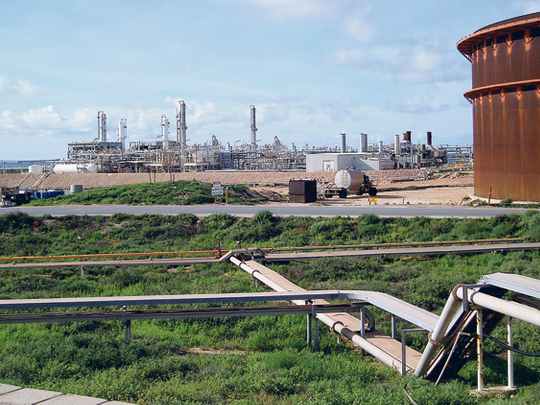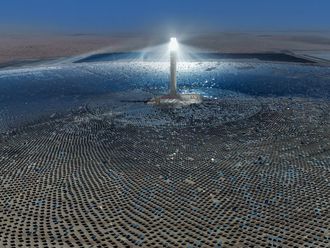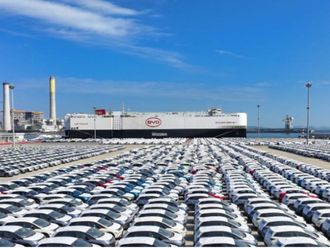
Washington: BP, seeking funds to pay for the biggest US oil spill in history, is in talks to sell some assets including its Alaska oil fields to Apache, two people familiar with the discussions said.
Apache, the largest independent US oil company by market value, is negotiating for assets that include a share in BP's Alaska business, for a price of less than $12 billion (Dh44 billion), according to one of the people, who asked not to be identified because the discussions aren't public.
"Apache is a very smart acquirer and that's been part of their growth over many, many years," Philip Dodge, an analyst at Tuohy Brothers in New York, said.
Apache, based in Houston, has bought BP assets before and is "a company that is very strong financially and liquid.'
BP scrapped its dividend and said last month it will sell some of its assets to raise $10 billion for clean-up costs, fines and legal damages from the Gulf spill. The company has spent more than $3 billion on the spill and agreed to establish a $20 billion fund for damage claims.
Rising costs
Robert Dye, a spokesman for Apache, and Max McGahan, a BP spokesman, declined to comment. The talks between BP and Apache were first reported by London's Times newspaper, which said the assets may be worth $12 billion.
Investors have sold BP's stock over concerns the company may struggle to cover the rising costs and fend off the political ramifications prompted by the April 20 drilling rig explosion. The stock has slumped 44 per cent as of July 9.
BP shares rose 13 per cent last week in London, the best weekly performance since the spill began. The cost of insuring BP's debt against default for five years fell for an eighth straight day on July 9.
Apache paid $1.3 billion in 2003 for BP assets in the Gulf of Mexico and the North Sea. The company last month completed the $1.05 billion purchase of Gulf assets from Devon Energy.
BP owns a 26 per cent share in the Prudhoe Bay and neighbouring fields in Alaska with ExxonMobil, ConocoPhillips and Chevron.
Prudhoe Bay field, the largest field in the US, came online in 1977 and can produce about 400,000 barrels of oil a day.
The field is averaging 234,772 barrels a day this month, according to Alaska state tax records. Its production is declining 10 per cent a year, according to BP's website. Because the field is more than 30 years old and output has been declining, Dodge said he would be surprised if Apache buys it.
"When Apache acquires, they always acquire something that has some growth possibilities to it," he said.
Prudhoe Bay and other Alaskan fields were BP's largest source of crude in the Western Hemisphere in 2009 after the Gulf of Mexico, according to a public filing.
Alaskan fields provided one in every 14 barrels of oil BP pumped worldwide last year. BP operates or owns stakes in 20 other fields on Alaska's North Slope, as well as four pipelines.
BP also is considering selling oil and natural gas fields in Colombia, Venez-uela and Vietnam, a person with knowledge of the matter said earlier this month. The company may dispose of its 60 per cent holding in Pan American Energy, Argentina's second-largest oil producer, the person said, declining to be identified because the information is confidential.
BP removed a cap over the leaking well in the Gulf of Mexico on Sunday, part of an effort to replace it with a new cap that will collect all of the crude.
The April 20 explosion aboard the Deepwater Horizon drilling rig resulted in the deaths of 11 workers.
BP's $1 billion of 4.75 per cent notes due in 2019, which plunged almost 25 cents to as low as 80.5 cents on the dollar in the two months following the Gulf of Mexico explosion, rose 0.5 cent to 90.75 cents to yield 6.143 per cent on July 9, according to Trace, the bond-price reporting system of the Financial Industry Regulatory Authority.
Credit-default swaps protecting against a BP default for five years fell 24 basis points to 371, according to CMA DataVision prices.












